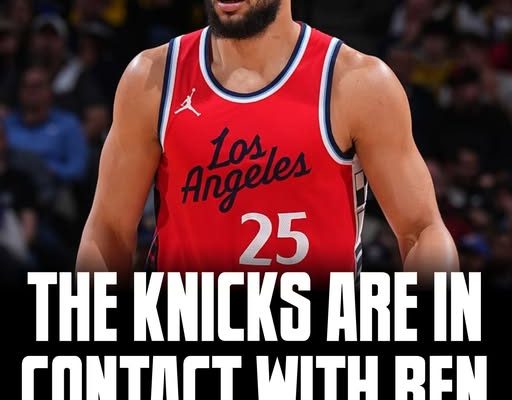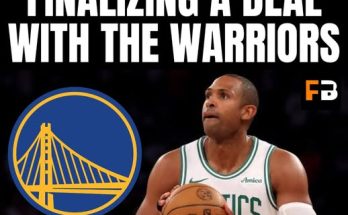Few developments in the NBA stir the pot like a potential resurgence story, especially when it involves a team with sky-high expectations like the New York Knicks and a player whose narrative has become one of the league’s most complex: Ben Simmons. News that the Knicks are in contact with Ben Simmons has reignited passionate debates among fans, analysts, and insiders alike. While many are curious, others are skeptical, yet the interest is rooted in something fundamental to sports—hope. The hope that an athlete once deemed elite can find his footing again and the hope that a franchise historically marked by chaos can finally get things right.
Ben Simmons, at one point, was a household name for the right reasons. A multi-time All-Star, an All-NBA defender, and arguably the most versatile point-forward in the game, Simmons brought a unique blend of size, speed, court vision, and defensive prowess. Drafted number one overall by the Philadelphia 76ers in 2016, he was expected to be the centerpiece of their “Process” alongside Joel Embiid. His early years in Philadelphia were filled with promise. Simmons averaged 16 points, 8 rebounds, and 8 assists per game in his rookie season, showcasing his ability to impact the game without being a volume shooter. However, as the years wore on, the lack of progression in his jump shot, particularly his aversion to even attempting three-pointers or mid-range jumpers, became increasingly glaring.
The infamous 2021 playoff series against the Atlanta Hawks seemed to break something, not just in Simmons, but in how he was viewed across the league. That moment when he passed up an open dunk in Game 7 spoke volumes about his confidence—or the lack thereof. The fallout was swift and brutal. He became a scapegoat, his relationship with the Sixers fractured beyond repair, and trade talks loomed. Eventually, Simmons was dealt to the Brooklyn Nets in a blockbuster deal involving James Harden, but injuries and mental health challenges have significantly hampered his ability to make an impact since.
Now, the New York Knicks are in contact with Simmons, and the league is paying attention. On the surface, this potential move might seem puzzling. The Knicks are coming off a season where they re-established themselves as a genuine Eastern Conference contender, boasting a deep roster that includes Jalen Brunson, Julius Randle, and RJ Barrett, as well as an ever-improving core of young role players. The team has also maintained financial flexibility and has draft assets, giving them multiple avenues for roster improvement. So why Simmons? Why now?
To understand this, one must look at the philosophical approach of the Knicks under President Leon Rose and head coach Tom Thibodeau. The Knicks have built their recent success on toughness, defense, and unselfish basketball. Simmons, at his best, aligns with these values. Despite his offensive limitations, his defense remains elite when healthy. He can guard positions one through five, create transition opportunities, and act as a secondary playmaker—traits that could complement the current Knicks core well, especially considering Thibodeau’s affinity for versatile defenders.
In theory, Simmons could take pressure off Jalen Brunson as a play initiator, allowing Brunson to operate more off-ball and preserve his energy for late-game scoring duties. He could also provide size and length in a Knicks backcourt that sometimes struggles defensively, especially in matchups against taller guards or wings. Simmons’ ability to push the pace could elevate New York’s often sluggish half-court offense. For a team that at times struggles in transition, having someone who can grab a rebound and run a fast break is invaluable.
However, this is all contingent on Simmons being healthy, engaged, and confident. That’s the gamble. The Knicks would have to assess his medicals thoroughly. Simmons’ back issues have been well-documented, and recurring injuries have prevented him from stringing together consistent performances in Brooklyn. Moreover, the mental aspect of his game—the thing that many say derailed his career more than any physical limitation—cannot be ignored. Is he ready to return to the pressure cooker that is Madison Square Garden, where every dribble is scrutinized, and every misstep is met with boos?
One can argue that New York, more than any other NBA city, is both the best and worst place for someone like Simmons. The fans are brutally honest, yet loyal when you win. The media attention is relentless, yet it provides a stage unlike any other. For someone like Simmons, whose confidence has clearly wavered over the past few years, the stakes would be immense. But that’s precisely what makes this possible union so intriguing. Redemption stories are rare in professional sports, but they’re also unforgettable.
Then there’s the contractual aspect to consider. Simmons is in the final year of his max contract, earning over \$40 million, a figure that far outweighs his current on-court value. Any trade or buyout would have to navigate salary matching and potential cap implications. For the Knicks, absorbing that kind of salary would likely mean parting ways with players like Evan Fournier or Bojan Bogdanović, whose contracts could help match salary while freeing up rotation space. There’s also the question of draft capital. Would the Knicks require the Nets or a third team to attach a pick to make taking Simmons worthwhile? Or are the Knicks betting on their medical and coaching staff to extract whatever value remains in the former All-Star?
Skeptics would argue that investing in Simmons at this point in his career is a waste of resources. They point to his failure to play more than 57 games since the 2018-19 season, his rapidly declining scoring averages, and his general reluctance to shoot as signs that the ship has sailed. There’s a valid argument there. Even during his tenure in Brooklyn, where he was expected to revitalize his career in a less demanding role, Simmons rarely looked like his former self. His numbers were pedestrian, and his impact was marginal at best.
Yet there are those who believe the NBA is a league of second (and third) chances, and Simmons is still just 28 years old. Players like Dwight Howard, Derrick Rose, and even Blake Griffin have found ways to extend their careers by adapting their games and embracing new roles. If Simmons is willing to do the same—if he’s willing to come off the bench, accept fewer minutes, and dedicate himself to the dirty work—he could carve out a meaningful place in New York’s rotation. He doesn’t need to be a star anymore. He just needs to be effective.
Of course, none of this happens in a vacuum. The Knicks have bigger ambitions. Their rumored interest in Simmons could be a smokescreen, part of a broader plan to stockpile assets and create leverage in future trade talks. Maybe they’re thinking of packaging Simmons’ expiring contract in a blockbuster deal for a true superstar. Or perhaps they view him as a low-risk, high-reward acquisition—a flyer on a player with elite upside and no long-term commitment. Either way, the mere fact that the Knicks are in contact with Simmons reveals something about how they view their current trajectory.
It’s also worth noting that Simmons is represented by Klutch Sports, the same agency that has deep ties with many league stars. That connection can sometimes serve as a bridge for future deals or relationships, and the Knicks may be playing the long game. In today’s NBA, relationships matter almost as much as talent. Teams that position themselves well politically often benefit down the road, and bringing Simmons into the fold, even temporarily, could be part of such maneuvering.
The fan reaction to these reports has been understandably mixed. Some fans see Simmons as a reclamation project worth investing in. Others believe the Knicks should steer far away from a player whose recent play has been uninspiring. There’s fear that his presence could disrupt team chemistry or occupy minutes better suited for younger, hungrier players. But there’s also the allure of a comeback—the idea that Simmons could re-establish himself under the bright lights of Madison Square Garden, rewriting his legacy in one of the league’s most storied arenas.
Ultimately, this potential move speaks to something larger than basketball. It speaks to the human capacity for resilience, for reinvention, and for risk. The Knicks, a team that has spent decades oscillating between hope and despair, may see in Simmons a mirror of their own journey—a once-celebrated figure seeking to reclaim lost glory. The gamble is real, but so is the reward.
If the Knicks do move forward and bring Ben Simmons into the fold, they will be doing so with eyes wide open. There is no guarantee of success. There is no assurance that he will stay healthy or rediscover his confidence. But there is the possibility, and sometimes, in sports, that’s all you need to take the next step.
Simmons, for his part, must be willing to embrace the grind. He must be honest about what he can and cannot do. He must rebuild not just his body, but his reputation. If he can do that, and if the Knicks provide the right structure and support, this could be the beginning of one of the most compelling redemption stories in recent NBA memory. And for a team like New York, which has spent far too long in the wilderness, that kind of story is worth chasing.
For now, all we have are reports. But in a league built on dreams, rumors, and what-ifs, sometimes a whisper is enough to change everything. And maybe, just maybe, the Knicks and Ben Simmons are both ready for a new chapter—together.



